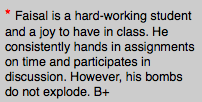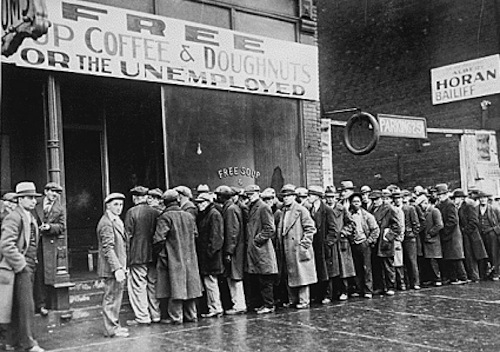Slate is midway through what is threatened to be a two-week series on income inequality in America, just in time for the controversial announcement that the President will not try to solve the economy by giving more money to rich people. Timothy Noah looks at several putative dangers to America’s middle class, including immigration, racism/sexism, and computers, none of which accounts for the growing gap between rich and poor in the United States. That gap is enormous. Currently, the wealthiest 1% of Americans take home 24% of the national income. Between 1980 and 2005, more than 80% of the nation’s considerable increase in earnings went to that 1%. To put that in perspective, back in 1915—the era of the Carnegies, Vanderbilts and Rockefellers, as well as a generation of non name-brand robber barons—the top 1% only got 18%. Economically, ours is a less equal America than that of our great grandparents.
Tag Archives: slate
Hilariously dumb trend piece sparks hilariously dumb trend war
Earlier this week, we discussed the possibility that the trend piece is becoming a new subgenre of newspaper writing, which I intend to start calling Speculative Journalism: stories that could be, but for which there is no actual evidence. As if to confirm our suspicions,*![]() Mark Oppenheimer published this piece in Slate, in which he worries that the increasing popularity of the Kindle will make it impossible to flirt with strangers based on what books they are reading. “As the Kindle and Nook march on,” he writes, “people’s reading choices will increasingly be hidden from view. We’ll go into people’s houses or squeeze next to them on the subway, and we’ll no longer be able to know them, or judge them, or love them, or reject them, based on the books they carry.” Oppenheimer’s position is obviously somewhat tongue-in-check. That doesn’t stop it from also being head-in-ass, though, as Erik Hayden and Eleanor Barkhorn pointed out in separate Atlantic articles. Thus began a war of words, and by “words” I mean specifically the words “digital age” and “social networking,” sandwiched within a series of hilariously inept arguments that culminate in yesterday’s wounded defense from Oppenheimer.
Mark Oppenheimer published this piece in Slate, in which he worries that the increasing popularity of the Kindle will make it impossible to flirt with strangers based on what books they are reading. “As the Kindle and Nook march on,” he writes, “people’s reading choices will increasingly be hidden from view. We’ll go into people’s houses or squeeze next to them on the subway, and we’ll no longer be able to know them, or judge them, or love them, or reject them, based on the books they carry.” Oppenheimer’s position is obviously somewhat tongue-in-check. That doesn’t stop it from also being head-in-ass, though, as Erik Hayden and Eleanor Barkhorn pointed out in separate Atlantic articles. Thus began a war of words, and by “words” I mean specifically the words “digital age” and “social networking,” sandwiched within a series of hilariously inept arguments that culminate in yesterday’s wounded defense from Oppenheimer.
Terrorism and the absurdity problem
Today in Slate, Timothy Noah asks, “Was the Times Square bomb the follow-on to 9/11 we’ve all been bracing for?” He’s not being funny, at least not on purpose. To Noah, Faisal Shahzad’s Nissan Pathfinder full of camping gas and fireworks, foiled by a t-shirt vendor when it smoked but did not explode, was the inevitable second strike. The enemy is  extraordinarily subtle. From a list of sketchy connections that includes Shahzad’s claim to have received bomb training in Waziristan* and the arrest of one of his associates at a mosque in Pakistan connected to Jaish-e-Mohammed—”the same al-Qaida affiliate that five young Muslim Americans from Alexandria, Va., contacted in Pakistan this past December”—Noah deduces a global network, presumably biding its time until it could accumulate enough fireworks. “It would appear that a second shoe has dropped,” he writes. Here’s a tip for young journalists hoping to remind America of the omnipresent threat of terrorism: don’t say “shoe.”
extraordinarily subtle. From a list of sketchy connections that includes Shahzad’s claim to have received bomb training in Waziristan* and the arrest of one of his associates at a mosque in Pakistan connected to Jaish-e-Mohammed—”the same al-Qaida affiliate that five young Muslim Americans from Alexandria, Va., contacted in Pakistan this past December”—Noah deduces a global network, presumably biding its time until it could accumulate enough fireworks. “It would appear that a second shoe has dropped,” he writes. Here’s a tip for young journalists hoping to remind America of the omnipresent threat of terrorism: don’t say “shoe.”



